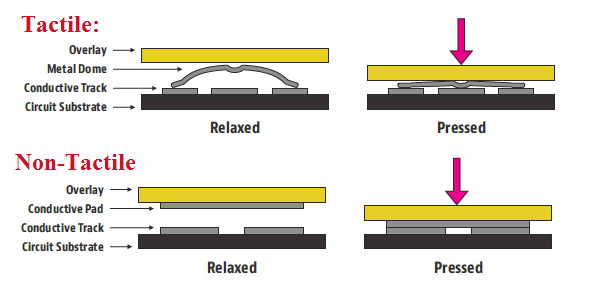Membrane Switches vs. Traditional Switches: What You Need to Know
Membrane Switches vs. Traditional Switches: What You Need to Know
Blog Article
Understanding the Value of Membrane Switches in Interface
Membrane switches are important elements in the design of efficient customer interfaces, helping with not only functionality but likewise improving visual allure and individual communication. As we discover the different benefits and future fads linked with Membrane innovation, it comes to be clear that these switches are a lot more than simply elements; they stand for a merging of technology and practicality.
What Are Membrane Switches?

The spacer layer, which contains adhesive homes, permits the splitting up of the circuit layer from the overlay, guaranteeing that the switch remains in a non-activated state till pushed. When stress is used to the overlay, it compresses the spacer layer, connecting the space and finishing the circuit in the underlying layer. This style not just decreases the physical area needed for conventional mechanical buttons but likewise boosts the durability of the device, as Membrane switches are usually resistant to dirt, dampness, and various other environmental variables.
Typically discovered in applications varying from consumer electronics to medical devices, Membrane buttons are integral to contemporary innovation, providing a efficient and user-friendly interface that aligns with modern design needs.
Benefits of Membrane Switches
While countless button modern technologies exist, Membrane Switches deal distinctive benefits that make them particularly preferable in different applications. Among the main benefits of Membrane buttons is their portable design, which permits space-saving executions in gadgets where property is restricted. Their thin account not just improves aesthetic appeal however also facilitates lightweight construction.
Another substantial benefit is their resistance to ecological aspects. Membrane switches are usually sealed versus wetness, dirt, and pollutants, making them optimal for usage popular environments, such as clinical tools and commercial equipment. This durability extends the life expectancy of the button, minimizing maintenance prices and enhancing dependability.
In addition, Membrane buttons can be tailored to fulfill specific layout needs, incorporating distinct graphics and colors that enhance user interaction. Their responsive comments options can likewise be customized to provide a gratifying individual experience. Additionally, Membrane buttons are cost-efficient, specifically in high-volume applications, as they can be generated successfully.
Applications in Various Industries

In the consumer electronic devices industry, Membrane buttons prevail in gadgets such as microwaves, washing machines, and remote controls. Their responsive feedback and visual choices enhance customer experience while giving a smooth, contemporary look. In addition, vehicle producers utilize Membrane switches in control panel controls and infomercial systems, where room is restricted, and individual involvement is vital.
Additionally, the commercial field leverages Membrane buttons in control panels for machinery and tools, permitting instinctive procedure in commonly harsh environments. Their resistance to chemicals and wetness ensures long life and dependability in these applications. On the whole, the flexibility of Membrane Switches contributes significantly to their widespread usage, making them indispensable in various technical domain names.
Design Considerations for Membrane Switches

When designing Membrane buttons, a number of crucial considerations need to be considered to ensure optimal functionality and user experience. The selection of materials is best site critical; picking durable, premium substratums can enhance the switch's longevity and resistance to environmental variables such as wetness and temperature changes.
Secondly, the design of the visuals overlay should prioritize clarity and convenience of usage. Icons and message read more must be clear, and the layout ought to help with instinctive communication (membrane switches). In addition, responsive feedback is important; including a responsive dome or other devices can improve the individual experience by offering physical confirmation of activation
An additional crucial factor is the button's electric performance. Designers should make certain that the conductive traces are effectively designed to minimize resistance and avoid signal interference. This includes assessing the called for actuation force and making sure compatibility with the electronic elements they will certainly interface with.

Future Trends in Membrane Modern Technology
As technology remains to breakthrough, Membrane switches are poised to read this article develop considerably, driven by innovations in materials and producing strategies. One arising pattern is the consolidation of sophisticated products, such as adaptable substratums and conductive inks, which boost longevity and decrease the total weight of Membrane switches. These materials not only enhance the tactile feedback but likewise permit the layout of buttons that can stand up to harsher ecological problems.
In addition, the integration of touch-sensitive innovations is changing typical Membrane Switches into even more interactive individual interfaces. Capacitive touch sensing units embedded within Membrane switch panels can provide an extra responsive and instinctive customer experience, aligning with the expanding need for streamlined, contemporary layouts in customer electronic devices.
Additionally, innovations in printing strategies, such as digital and 3D printing, make it possible for fast prototyping and personalization of Membrane buttons. This adaptability allows manufacturers to react a lot more swiftly to market needs and customer choices.
Lastly, sustainability is coming to be a considerable emphasis, with manufacturers exploring eco-friendly materials and processes. As these fads unfold, the future of Membrane modern technology assures boosted capability, aesthetic appeal, and environmental responsibility, solidifying their role in advanced interface across different sectors.
Verdict
To conclude, Membrane Switches stand for a vital element in the design of individual interfaces, incorporating performance with visual flexibility. Their benefits, consisting of durability and resistance to ecological elements, make them appropriate for varied applications throughout different sectors. Thoughtful design factors to consider enhance individual communication and experience. As innovations in innovation proceed, the development of Membrane buttons is anticipated to further fine-tune interface, driving advancement and boosting usability in a progressively intricate technological landscape.
Membrane switches are important elements in the design of reliable user interfaces, promoting not just functionality however additionally improving aesthetic charm and user communication.Membrane Switches serve as a crucial component in various user interfaces, assisting in a seamless interaction in between individuals and electronic gadgets.While various switch innovations exist, Membrane Switches offer distinctive advantages that make them specifically preferable in numerous applications.Moreover, Membrane switches can be tailored to satisfy specific design demands, integrating distinct graphics and shades that boost user communication.In conclusion, Membrane Switches stand for an essential part in the layout of individual interfaces, integrating capability with aesthetic flexibility.
Report this page